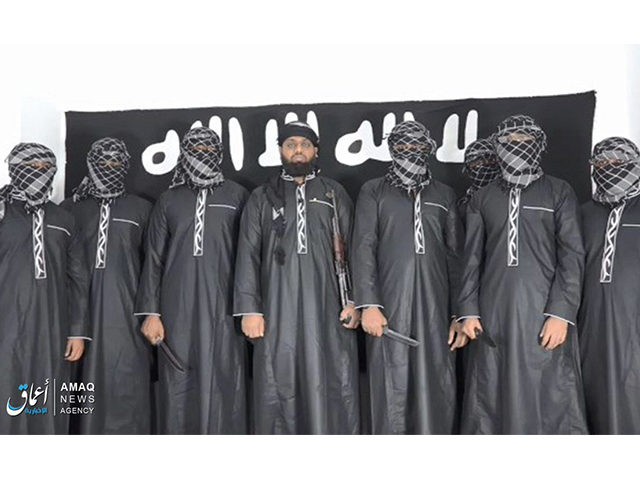Most of the jihadis who targeted Christians in Sri Lanka on Easter Sunday with a wave of suicide bombings that left hundreds dead and wounded at churches and high-end hotels are “well-educated people” from affluent families, the South Asian island nation’s deputy defense minister revealed on Wednesday.
Deputy Defence Minister Ruwan Wijewardene’s comments contradicted assertions by former U.S. President Barack Obama’s administration that a lack of economic opportunities is a top driver of Islamic terrorism.
“Most of [the suspected terrorists] are well-educated and come from upper middle class, and so they are financially independent,” the minister told reporters, according to BBC.
“Their thinking is that Islam can be the only religion in this country,” he also said, according to the Associated Press (AP), adding that at least one of the terrorists got a law degree and studied in the U.K. and Australia.
Without identifying him, Wijewardene noted that “one of the suicide bombers studied in the UK and then, later on, did his post-graduate [degree] in Australia before coming back to settle in Sri Lanka.”
An unnamed British security official identified the suicide bomber believed to have studied in the U.K. between 2006 and 2007 as Abdul Lathief Jameel Mohamed, noting that he was not on the British intelligence’s radar, AP revealed.
The revelation came as the death toll from the Easter attack climbed to 359, including four Americans, and the number of wounded stood at about 500, including several U.S. citizens.
Under Obama, the U.S. launched a new global counter-terror fund to leverage public and private money to provide what then-Secretary of State John Kerry described as “more economic opportunities for marginalized youth at risk of [jihadi] recruitment.”
The Obama administration unveiled the $200 million initiative although, as CNSNews.com pointed out, “much research has debunked the notion of a link between poverty and Islamist terrorism.”
In March 2016, AP reported that ISIS was seeking to recruit well-educated individuals with sophisticated skills in Pakistan, noting that the group was targeting university students, doctors, lawyers, journalists, and businessmen and using educated women for its fundraising operations.
Several news outlets note that the April 21 Sri Lanka attacks on three churches and four hotels in different parts of the country marked one of the deadliest Islamic terrorist attacks in modern history and the worst violence in Sri Lanka since its civil war ended a decade ago.
Initially, local authorities said jihadis carried out the attacks on behalf of a local Islamic terrorist group known as the National Thowfeek Jamaath (NTJ), stressing that they likely received support from outside the country. However, Wijewardene on Wednesday claimed the attackers had broken away from NTJ and another group identified only as “JMI.”
His comments came a day after the Islamic State (ISIS/ISIL), which maintains a presence in the neighboring Afghanistan-Pakistan region, claimed responsibility for the attacks.
Via its AMAQ news agency, ISIS claimed the suicide bombers pledged allegiance to the jihadi group before the attack, showing a video purportedly showing eight Sri Lankan jihadis vowing loyalty to the group.
Sri Lankan authorities have identified one man from the video who had his face uncovered as the possible mastermind of the attacks — Mohamed Zahran.
AP noted, “Authorities remain unsure of the group’s involvement, though authorities are investigating whether foreign militants advised, funded or guided the local bombers.”
Reuters added:
Leaders of three prominent Sri Lankan Muslim groups told Reuters they had held several meetings with Sri Lankan defense and intelligence officials in the past three years to warn about Zahran’s radical beliefs, after he began posting content that included messages supportive of Islamic State.
Officials from New Zealand and other countries have reportedly denied claims by Sri Lankan officials that the attacks were retaliation for assaults on mosques in Christchurch.
On Wednesday, AP noted:
The [Sri Lankan] capital of Colombo … remained rattled by reports that police were continuing to conduct controlled detonations of suspicious items three days after the attacks on churches and luxury hotels, and the U.S. ambassador said that Washington believes “the terrorist plotting is ongoing.”
Ruwan Gunasekara, a spokesman for the local police, said that authorities had arrested a total of 58 people in connection to the barbaric act.
U.S. Ambassador Alaina Teplitz noted that the FBI and U.S. military officials are helping with Sri Lanka’s ongoing investigation.
“Clearly there was some failure in the system,” she reportedly declared but added that the United States did not have prior knowledge of a threat before the assault.
Lakshman Kiriella, the leader of the Sri Lankan parliament, accused senior local officials of deliberately withholding intelligence from neighboring India before the April 21 attacks.
“He said information about possible attacks was received from Indian intelligence on April 4 and a Security Council meeting was chaired by President Maithripala Sirisena three days later, but it was not shared more widely,” AP reported.
Sri Lankan President Maithripala Sirisena and Prime Minister Ranil Wickremesinghe, however, reportedly denied receiving Indian intelligence.
“The military has been given sweeping police powers it last used during a devastating civil war that ended in 2009,” AP noted.
There have been conflicting reports on the total number of suicide bombings on Easter Sunday. Some officials say seven, while others claim nine.
Although the majority of Sri Lankan’s are Buddhists, the country is home to a significant number of Hindus, Muslims, and Christians.

COMMENTS
Please let us know if you're having issues with commenting.